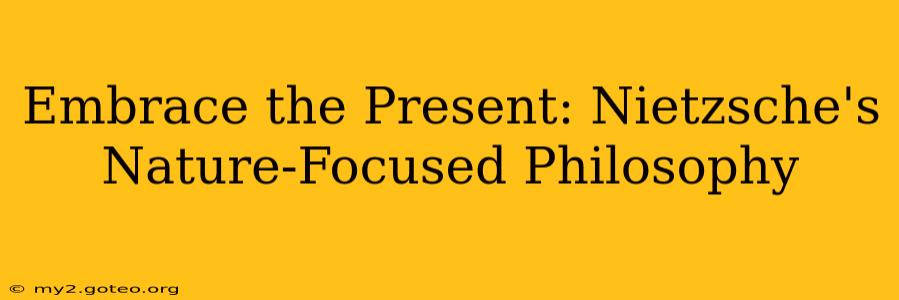Friedrich Nietzsche, a towering figure in 19th-century philosophy, is often associated with concepts like the Übermensch and the will to power. However, a closer examination reveals a profound engagement with nature, deeply interwoven with his broader philosophical project. Nietzsche's philosophy isn't merely a system of abstract ideas; it's a call to experience life fully, and for him, that meant embracing the present moment and finding strength and inspiration in the natural world. This exploration delves into Nietzsche's nature-focused philosophy, exploring how his perspectives on nature shaped his core beliefs and offer guidance for contemporary life.
How Did Nature Influence Nietzsche's Philosophy?
Nietzsche's upbringing in the picturesque landscapes of Saxony significantly influenced his worldview. The rugged beauty of the mountains and the changing seasons instilled in him a deep appreciation for the cyclical nature of life, death, and renewal – themes that resonate powerfully throughout his writings. He saw nature not as a static backdrop but as a dynamic force, constantly evolving and overflowing with life, struggle, and creativity. This dynamic view challenged the static, rationalistic perspectives prevalent in his time. He found solace and inspiration in nature's raw power, observing its relentless processes of creation and destruction as a model for human existence.
What is Nietzsche's Concept of "Eternal Recurrence"?
Central to Nietzsche's philosophy is the concept of "eternal recurrence," the idea that every moment in time will repeat itself infinitely. This isn't a literal repetition, but a thought experiment designed to assess the value of one's life. Would you embrace the eternal return of every moment, both joyous and painful? If the answer is yes, it signifies a profound acceptance of life on its own terms, a commitment to living each moment fully and authentically. Nature, with its cyclical processes, provided a framework for understanding this concept. The seasons repeat, life and death intertwine; nature embodies the eternal recurrence, demonstrating that even decay and destruction are essential parts of a continuous, regenerative cycle.
Did Nietzsche Believe in a Higher Power or God?
Nietzsche famously declared "God is dead," not as a literal statement about the demise of a deity, but as a commentary on the decline of traditional religious belief and morality in modern society. He saw the inherent vitality and power of nature as surpassing any imposed theological framework. Nature, with its indifference to human constructs, challenged the anthropocentric view prevalent in many religious doctrines. For Nietzsche, the inherent value of life wasn't bestowed by a divine being but stemmed from the will to power, the life force that drives all living things, powerfully embodied in the natural world's constant struggle for existence.
How Can We Apply Nietzsche's Nature-Focused Philosophy to Modern Life?
Nietzsche's engagement with nature provides valuable lessons for contemporary life. In an increasingly technologically driven world, his emphasis on direct experience and engagement with the natural world serves as a powerful antidote to alienation and disconnection. By embracing the present moment, accepting the cyclical nature of life, and finding inspiration in the raw power of nature, we can cultivate a more fulfilling and meaningful existence. His philosophy encourages us to confront life's challenges head-on, embracing both joy and suffering as integral parts of a vibrant, dynamic life. It's a call to live authentically, to find strength in our own capacities, and to connect with the powerful, life-affirming forces of nature.
How Does Nietzsche's Philosophy Differ from Other Nature Philosophies?
While sharing some common ground with other nature philosophies, Nietzsche's approach offers a unique perspective. Unlike some romantic ideals of nature as pristine and idyllic, Nietzsche acknowledges its brutality and indifference. He doesn't shy away from the harsh realities of the natural world, viewing the struggle for existence as a driving force for growth and development. His emphasis on the will to power and the acceptance of suffering sets him apart from more passive or harmonious conceptions of the relationship between humanity and nature.
What are Some Criticisms of Nietzsche's Philosophy?
Nietzsche's philosophy has faced criticisms, some stemming from interpretations of his concept of the will to power as promoting amorality or social Darwinism. Others criticize the potential for misinterpretations of eternal recurrence, leading to nihilism or a disregard for ethical considerations. Furthermore, some argue his focus on individual strength overlooks the importance of social responsibility and cooperation. However, a careful and nuanced understanding of his work reveals a complex and multifaceted philosophy that, when properly interpreted, offers valuable insights into the human condition and our relationship with the natural world.
By embracing the wisdom inherent in Nietzsche's nature-focused philosophy, we can cultivate a deeper appreciation for the present moment, a stronger connection with the natural world, and a more resilient and authentic approach to life. His legacy invites us to move beyond abstract concepts and engage directly with the powerful, dynamic forces that shape our experience.

